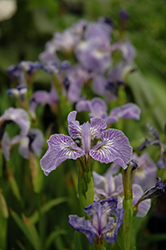It's all about ...
plants

Dwarf Arctic Iris
Iris setosa var. arctica
Plant Height: 6 inches
Flower Height: 8 inches
Spacing: 8 inches
Sunlight:
![]()
![]()
Hardiness Zone: 2b
Other Names: Beachhead Iris
Description:
This short, dwarf iris features lovely lavender-blue blooms, with dark purple veining, rising just above the foliage; an interesting addition to border fronts; also excellent massed in groupings in the garden; will eventually form dense colonies
Ornamental Features
Dwarf Arctic Iris has masses of beautiful lavender flag-like flowers with blue overtones, white throats and deep purple veins at the ends of the stems from late spring to early summer, which are most effective when planted in groupings. The flowers are excellent for cutting. Its grassy leaves remain light green in colour throughout the season.
Landscape Attributes
Dwarf Arctic Iris is an herbaceous perennial with an upright spreading habit of growth. Its relatively fine texture sets it apart from other garden plants with less refined foliage.
This plant will require occasional maintenance and upkeep, and should be cut back in late fall in preparation for winter. Deer don't particularly care for this plant and will usually leave it alone in favor of tastier treats. Gardeners should be aware of the following characteristic(s) that may warrant special consideration;
- Insects
Dwarf Arctic Iris is recommended for the following landscape applications;
- Mass Planting
- Rock/Alpine Gardens
- Border Edging
- General Garden Use
- Groundcover
- Naturalizing And Woodland Gardens
- Container Planting
Planting & Growing
Dwarf Arctic Iris will grow to be only 6 inches tall at maturity extending to 8 inches tall with the flowers, with a spread of 12 inches. When grown in masses or used as a bedding plant, individual plants should be spaced approximately 8 inches apart. It grows at a medium rate, and under ideal conditions can be expected to live for approximately 10 years. As an herbaceous perennial, this plant will usually die back to the crown each winter, and will regrow from the base each spring. Be careful not to disturb the crown in late winter when it may not be readily seen!
This plant does best in full sun to partial shade. It prefers to grow in average to moist conditions, and shouldn't be allowed to dry out. It is not particular as to soil type or pH. It is somewhat tolerant of urban pollution. This species is native to parts of North America. It can be propagated by division.
Dwarf Arctic Iris is a fine choice for the garden, but it is also a good selection for planting in outdoor pots and containers. It is often used as a 'filler' in the 'spiller-thriller-filler' container combination, providing a mass of flowers against which the larger thriller plants stand out. Note that when growing plants in outdoor containers and baskets, they may require more frequent waterings than they would in the yard or garden. Be aware that in our climate, most plants cannot be expected to survive the winter if left in containers outdoors, and this plant is no exception. Contact our experts for more information on how to protect it over the winter months.
